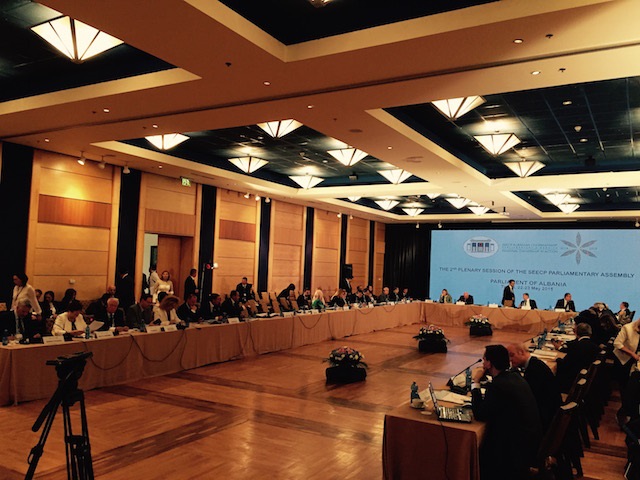
Tirana - Closer regional cooperation and contacts between the countries of the South-East European Cooperation Process (SEECP) are of great importance in dealing with current security challenges, terrorism and organised crime, as well as in implementing joint economic projects and stepping up integration with the EU, it was said at the 2nd session of the SEECP Parliamentary Assembly in Tirana on Saturday.
Parliament speakers and parliamentary delegations from 12 member-countries of this regional forum gathered in the Albanian capital to discuss activities during Albania's year-long presidency and to adopt decisions to further strengthen parliamentary cooperation between the SEECP countries.
Croatia's parliamentary delegation attending the event was headed by Parliament Speaker Josip Leko.
The current SEECP chair, Albanian Parliament Speaker Ilir Meta, underlined the positive results and progress achieved, notably related to the European integration process, but noted that the economic crisis and the latest developments in the region, which posed a joint challenge to security and stability, pointed to the burning problem of unemployment and poverty, which, he said, was why the SEECP should turn to concrete economic and infrastructure projects while stepping up the European integration process and strengthening the rule of law.
Meta said this particularly referred to stepping up trade, improving the region's transport and energy interconnectedness and creating favourable conditions for enterprise and investment, as well as further aligning regional legislations with EU law.
Croatian Parliament Speaker Josip Leko pointed to the need to act through concrete projects and make use of pre-accession funds.
"The SEECP must be more determined in assuming the role of the umbrella mechanism for achieving a synergy of different regional initiatives and forms of cooperation related to economic and social development, energy and infrastructure, security and judiciary," said Leko, adding that Croatia was interested in seeing its neighbouring countries join European integration processes faster and more resolutely and that it saw the SEECP as one of the facilitators of such integration.
While the Tirana meeting was agreed on common objectives, there was no consensus on the seat of the SEECP Secretariat, moreover a heated debate ensued. Turkey is interested in having the SEECP Secretariat located in Istanbul, and Bulgaria wants it to be in Sofia.
Eight SEECP members support Istanbul's candidacy, three are in favour of Sofia, and one is undecided.
Turkey's position was that this should be sufficient to make a decision, but a debate ensued over the issue of whether the decision on the matter is a technical or a political one and if it should be made by outvoting or by consensus.
Eventually, the decision on the location of the SEECP Secretariat was not made and the matter will have to be additionally discussed.
The meeting adopted a joint declaration underlining the role of the SEECP Parliamentary Assembly in supporting the member-countries' parliaments in aligning national laws with EU law and calling on the parliaments of the SEECP member-countries that are already EU members to help in the transfer of knowledge and experience related to the adoption of the EU acquis communautaire.
The document also confirmed that the parliament of the SEECP chair should coordinate activities until the election of the Secretariat, it called on Pristina to join the work of the SEECP at all levels and entrusted the secretary-general of the Regional Cooperation Council (RCC) to present to the main committees of the SEECP Parliamentary Assembly and discuss with them the RCC's projects and programmes and to report regularly to the Parliamentary Assembly on its activities.
In July, Bulgaria takes over from Albania the chairmanship of the SEECP.